- Home
- Richard Lee Byers
The Captive Flame: Brotherhood of the Griffon • Book 1 Page 17
The Captive Flame: Brotherhood of the Griffon • Book 1 Read online
Page 17
Then they all tramped some distance through the city. Thanks to the wyrmkeeper’s restorative magic, Jhesrhi expected that she’d continue to recover from her wounds with preternatural speed. But for now she was still weak and sore, and the walk taxed her severely. She might have been glad when her foes pointed her toward the entrance to the ruins of an old warehouse, except that she had every reason to be wary of whatever waited inside.
First she caught its odor, the tang of a gathering storm like she’d smelled that afternoon. Then she saw the sparks jumping and popping on the body that was simply a huge, shapeless mass in the dark. Eyes big as serving platters glowed white at the top of the murky form.
“I see you caught them,” the creature said, its voice a sort of rumbling hiss.
“Yes, milord,” the wyrmkeeper said. “Unfortunately, a spy loyal to one of your brothers discovered us at our work. But he won’t tell anyone what he saw.”
“That’s all right, then. Tie the prisoners to my back.”
Jhesrhi felt a pang of dread and tried to shake it off. To take comfort in the fact that at least the dragon didn’t mean to torture or kill her and Gaedynn on the spot.
Someone produced a long coil of rope, and the worshipers of the Nemesis of the Gods proceeded to obey the wyrm’s command. Meanwhile, Jhesrhi noticed, although she hadn’t been able to tell it from the street, that most of the derelict building was open to the sky. A creature with wings wouldn’t have much trouble entering from above.
Or exiting in the same manner—as the blue dragon proved by lashing its own batlike wings and carrying Gaedynn and Jhesrhi aloft. In a hundred heartbeats or so, Mourktar was left behind.
S
I
X
29 TARSAKH-GREENGRASS
THE YEAR OF THE AGELESS ONE (1479 DR)
Fires burned in the southwest. Khouryn couldn’t see the flames, but no one could miss the columns of black smoke, even against a gray sky.
He clucked and urged his dappled mare forward. The dragonborn bred big, powerful horses to bear their weight, and though his was the smallest Perra had to offer, she was still an enormous steed for a dwarf. But he’d ridden all sorts of mounts since leaving East Rift, and he managed well enough.
He caught up with Medrash and Balasar, who sat silently contemplating the smoke like everyone else. “What is it?” he asked.
“War,” Medrash said.
Wonderful, Khouryn thought sourly. Because his wife and home were on the far side of that war, and with Vigilant gone he couldn’t just fly over it, now could he?
“Pick up the pace!” Perra called. Evidently the sight of the smoke made it seem even more urgent that she confer with her master as soon as possible.
So they rode or marched faster, and by the end of the morning, Djerad Thymar came into view. For some time afterward, Khouryn kept squinting at it. He was sure some trick of perspective was making the place look bigger than it really was.
But it wasn’t so. The closer they approached, the more obvious it became that the dragonborn had built themselves a veritable mountain of a city. The structure rested on a colossal block of granite. On top of that, hundreds of gigantic pillars supported a kind of pyramid with a flattened apex. In its totality, the edifice towered more than a thousand feet high.
Since sighting the smoke, the ambassador and her retainers had been taciturn. But now Balasar noticed Khouryn staring, and grinned a fierce-looking reptilian grin. “Impressed?”
“I’d have to say yes,” Khouryn replied.
“I hear you dwarves build things just as grand.”
“We do. But we start with caverns and dig and carve. To begin in the open air with nothing more than a piece of ground, quarry all those big, heavy pieces of stone, haul them cross-country, set them one on top of another, layer on layer …” Khouryn shook his head. “Your ancestors must have been out of their minds.”
Medrash looked over his shoulder. “Keep up,” he said.
The paladin’s curt manner reminded Khouryn that grim times had come to Tymanther, not that he needed reminding. There were numerous indications as the company crossed the fields surrounding the city. Though he couldn’t quite make out what sort of beasts they were riding, he spotted several aerial cavalry patrols taking off from the platform at the top of the truncated pyramid. Meanwhile, drums thumped out a somber cadence from the open, colonnaded space underneath the bottom. He inferred the sound was a call to arms, a funerary observance, or both.
A wide ramp led up the outside of the slab. Farmers, soldiers, and other folk drew to the edges to let the ambassador’s party by. At the top, Khouryn and his companions passed into shadow. The pyramid perched above them blocked out much of the sky.
Before them was an agora with rings of shops around it. The travelers proceeded along the edge of the commercial area, between the outermost mercantile establishments and a row of pillars, until they reached a rectangular structure that clearly served as a stable and likely performed other functions as well.
Grooms marked with the jade-ring piercings of Clan Ophinshtalajiir hurried to take charge of the horses and to clamor greetings. Perra responded cordially, but also with a briskness that made it clear she didn’t have time for chitchat.
As everyone dismounted, Khouryn said, “I suppose I can stick here for the time being.”
“Please don’t,” Perra said. “You were in the thick of it, just like Medrash and Balasar. The vanquisher may wish to question you.”
“Whatever you want,” Khouryn said.
She led the three warriors past the stalls into a tack room that smelled of leather and the oil that kept it supple. “Since we’re in a hurry, I’m about to trust the three of you with a secret of my clan. Just a little one, but I expect you to keep it.” Using a claw tip, she traced a right triangle on a bare section of wall.
The world seemed to flash and lurch, and then they were standing in a different room. Khouryn realized magic had shifted them through space. Up into the pyramid, he assumed.
They strode on through what proved to be a handsomely appointed residence, where other dragonborn bearing jade rings hailed Perra with even greater surprise. As before, she didn’t let anyone delay her for more than a moment or two, and when she’d shaken off the last of her well-wishers, she swept through an arch, between a pair of sentries, and into a passage that was plainly a public thoroughfare.
That in turn led to a plaza, an atrium that rose from the pyramid’s floor all the way to its ceiling, where huge bats hung wrapped in their folded wings. Catwalks crisscrossed among them, a clue that the beasts weren’t vermin, but rather the flying mounts Khouryn had seen swooping and fluttering across the sky outside.
Countless balconies jutted from the walls, and—rather to his surprise—beds of flowering plants flourished on the floor, suffusing the air with the scent of verdure. Evidently the magical glow illuminating the space nourished them as well as sunlight would.
“Don’t stop and gawk,” Medrash said. Then, possibly realizing how harsh he’d sounded, he softened his tone. “I understand the urge. I was the same way when I first got to Luthcheq. But Balasar and I will show you around later.”
They marched on into a succession of chambers that—by virtue of their spaciousness and general magnificence, and the number of guards and bustling servants in evidence—Khouryn took to be the residence of the vanquisher. Perra spoke to a functionary who then hurried away, hurried back shortly thereafter, and conducted the newcomers into an audience chamber.
Khouryn’s first impression was that like Shala Karanok’s, the Tymantheran monarch’s hall celebrated war. But here, suits of armor on stands took the place of the sculptures, and the cracked, faded frescos all depicted heroic struggles against dragons. There were wyrm heads mounted on the walls too, and old yellowed claws the size of short swords on display in trophy cases.
Tarhun, the vanquisher himself, was as hulking a dragonborn as Khouryn had yet seen, with a greatsword cradled in hi
s hands to serve as a symbol of office. Square bits of gold studded the green hide under his eyes like teardrops. “Perra!” he boomed, as soon as she and her companions entered. “What does this mean?”
Perra, Medrash, and Balasar all bowed while sinuously sweeping their hands outward. Khouryn copied the salute as best he could.
“The war hero expelled us from Chessenta,” Perra replied. “I take full responsibility.”
Tarhun grunted. “Before we go assigning blame, maybe you should explain exactly how it happened.”
“Yes, Majesty.” Perra gave him the story as clearly and concisely as, Khouryn suspected, such a bewildering mess could be related.
When she finished, Tarhun’s eyes shifted to Khouryn. Who saw curiosity and calculation there, but none of the distrust and distaste he’d so often encountered in Chessentan faces. “And you must be the sellsword officer who helped my emissaries in Luthcheq and again on the road home,” the vanquisher said.
“Yes, Majesty,” Khouryn said.
“For that,” Tarhun said, “Tymanther thanks you. Will you and your spearmen stay on in my service, for a season or a year? I can use your skills, and I’ll pay well.”
“Thank you. But we’re content in the Brotherhood of the Griffon, and the Brotherhood already has a contract.”
Tarhun grimaced. “Which could mean that the next time I see you, it will be at the wrong end of a battlefield.”
“Maybe not, Majesty. Shala Karanok expects to have her hands full with the Great Bone Wyrm.”
“An enemy we dragonborn would gladly help her fight, if …” The monarch shook his head. In that moment, his manifest strength notwithstanding, his manner conveyed an emotion not too far removed from despair.
“Majesty,” Medrash said, “if I may speak—from the smoke in the sky, I gather we have our own war to concern us.”
“Yes,” Tarhun said. “With the ash giants.”
“They’ve been raiding for generations,” Medrash said. “But as far as I know, no one ever gave them the honor of beating the war drums for them before.”
“It’s different this time. They’re coming in greater numbers and in a more organized fashion. Someone has united the tribes. They certainly seem to be fighting more cleverly, although the details are sketchy. Many of those who engaged them didn’t return to tell the tale.” The vanquisher barked a mirthless laugh. “I know I just said I would have helped Chessenta, but in truth we could use their help just as much. And if Shala actually does attack us, or if she merely permits the genasi to cross her territory and attack, then we’ll have to fight two foes simultaneously.”
“Majesty,” Perra said, “I need to make sure I understand what’s really happening if I’m to be of any use to you. And so, though I don’t wish to give offense, I’ll ask directly—did you send raiders into Akanûl and simply not tell me about it?”
Tarhun glowered. “Of course not.”
“Did you send assassins into Luthcheq?”
“Again, of course not. The dishonor aside, what possible reason could there be?”
“Did you lend warriors to High Imaskar to serve aboard her ships?”
“You know better than anyone how fast I’ve danced to stay neutral in the quarrel between Chessenta and the Imaskari. And even if my policy had changed, I need every soldier I have to fight the giants.”
“You know,” Balasar drawled, “the last I heard, the Imaskari have an ambassador in Djerad Thymar. Somebody could ask him what’s going on in their navy, and possibly unravel one little corner of this tangle, anyway.”
“That,” said Tarhun, “is a sensible idea. Certainly more sensible than what usually comes out of your mouth, scapegrace. Fetch Nellis Saradexma.”
They didn’t have to wait long. The Imaskari ambassador probably lived in apartments handy to the royal residence. Tall and thin, he had a high, broad slab of a forehead and a receding hairline that made it seem even more prominent.
Gray lines marbled his skin. Khouryn might have taken them for scars or a souvenir of some illness that marked its victims like the pox, except that the retainers accompanying Nellis had them too. Evidently the marks were a characteristic peculiar to their race, like the patterns etching the bodies of the genasi.
The envoy wore a high-collared coat with three layers of shoulder cape attached. The silvery fabric gleamed and rippled in the light. The shirt, sash, and trousers underneath were black, as were the several rings on his fingers and the wizard’s orb tucked under his arm.
He had to palm the crystal globe in one long-fingered hand to bow as the dragonborn did on entering the presence of their overlord, and he managed it deftly. “Majesty. How may I be of service?”
“You can tell me,” Tarhun said, “about the Imaskari’s naval operations against Chessenta.”
Nellis frowned. “As Your Majesty knows, Chessenta has been raiding High Imaskar for years, with no better justification than a hatred millennia out of date. We’re simply retaliating in kind. I daresay that in our place, Tymanther would do as much and more.”
“Maybe,” Tarhun said. “But the war hero believes there are dragonborn serving aboard your warships. I need to know if it’s true before I end up in the middle of your quarrel.”
Nellis hesitated. “To the best of my knowledge, Majesty, that’s not true.”
“What does that mean?” Tarhun replied. “To the best of your knowledge?”
“I have a guess,” Medrash said, “if you wish to hear it.”
Tarhun gave him a nod.
“High Imaskar has never been much of a naval power,” the paladin continued. “That’s why the Chessentan privateers were able to cause so much harm. And my suspicion is, the Imaskari still don’t have many warships they can truly call their own. Someone else is striking back at Chessenta on their behalf, and that’s why even a high official like Lord Nellis doesn’t know the details.”
The vanquisher turned his gaze back on Nellis. “Is it so?”
The envoy took a breath. “Essentially. As Sir Medrash says, my people have no great seafaring tradition. Nevertheless, we laid plans to defend ourselves from the war hero’s pirates. Then, however, enormous worms and other creatures started attacking from the Plains of Purple Dust. We’ve always had some trouble with them, but in times past the Giant’s Belt and Dragonsword ranges served as natural barriers to hold most of them back. Suddenly that didn’t seem to be true any longer. Which meant we had to counter multiple threats, not just one. It was at that point that emissaries from Murghôm came to us with a proposal.”
“Murghôm,” Tarhun said. His disgust was plain, and mirrored in the expressions of other dragonborn in the hall.
“Yes,” Nellis said. To his credit, his voice remained steady despite the dragonborn’s sudden hostility. “As you’d expect, not all of it, but several of the principalities allied for a common enterprise. They offered to see to our naval defense in exchange for gold, free access to the Alamber, and certain trading concessions.”
Khouryn had never visited High Imaskar—or Murghôm either—but he visualized the map of the East he carried in his head, and then he understood. If they chose, the Imaskari plainly could deny the merchant vessels of Murghôm passage down the Rauthenflow to the sea, or charge them a toll to traverse the river.
“I understand your need,” Tarhun said, “but it still sickens me that your empress would strike a bargain with dragons. I thought better of your people.”
“Majesty, I’m sorry if we’ve lost your good opinion. But we needed help, and neither you nor … anyone else who claimed to be our friend would join us in a fight against Chessenta. We took aid where we could get it. And earlier, I alluded to feuds and prejudices that persist even after they stop making any kind of sense. I respectfully suggest you consider the fact that the dragon princes of Murghôm aren’t the same wyrms who oppressed your ancestors in the faraway land where you once lived. They’re a different group of dragons altogether.”
“A dragon is a drag
on,” Tarhun replied. “Your people will learn that eventually, and I hope you don’t pay too high a price for the lesson. Now, since your people have helped to poison Tymanther’s relationship with Chessenta—”
“Majesty, as I already made clear, that isn’t so. There can’t be dragonborn on those warships, because dragonborn only come from Tymanther. If a significant number of them had traveled to Murghôm to take service with the dragon princes, surely you’d know.”
Tarhun faltered, no doubt because Nellis had made a sensible argument. Assuming it was valid, it also explained why unidentified dragonborn shouldn’t be committing outrages in Luthcheq and Akanûl either. Even though Khouryn had come face to face with the former and was starting to believe in the existence of the latter.
The vanquisher started again. “Be that as it may, milord, High Imaskar professes friendship for Tymanther. Will you stand with us if Chessenta attacks?”
Nellis shifted his gleaming black orb from the crook of one arm to the other. “Majesty, we’re already fighting Chessenta on the sea, and I’m confident that will continue. I can’t commit land troops to Tymanther’s defense without consulting the empress. I know she’d want to send them, but it might not be possible until we counter the threat from the Purple Dust.”
“Will she also want to send them if Shala Karanok grants passage to a genasi army?”
Now it was Nellis’s turn to hesitate.
“I’ll spare Lord Nellis the awkwardness of answering that question,” Perra said. “Toward the end of my time in Luthcheq, it came to light that Akanûl and High Imaskar have sealed an alliance.”
“That’s an … overstatement,” Nellis said. “Naturally, we Imaskari want to trade with as many—”
“Dragons and genasi?” Tarhun snarled. “Get out, milord. I’ll send for you again when I feel sure of my ability to give you the courtesy due an ambassador.”
The Imaskari bowed and withdrew.
Light rippling on his emerald scales, the vanquisher turned to Khouryn, Medrash, and Balasar. “Sirs, I excuse you as well. No doubt you’d like to refresh yourselves after your journey. Perra, my deputies, and I have a long palaver ahead of us.”

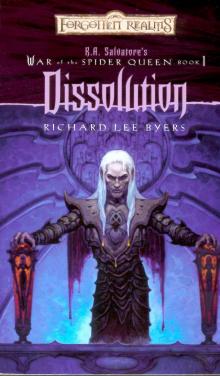 Dissolution
Dissolution Arkham Horror- Ire of the Void
Arkham Horror- Ire of the Void The Haunted Lands: Book II - Undead
The Haunted Lands: Book II - Undead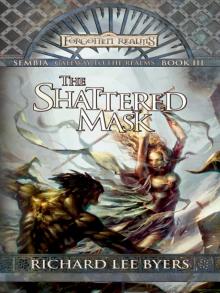 The Shattered Mask
The Shattered Mask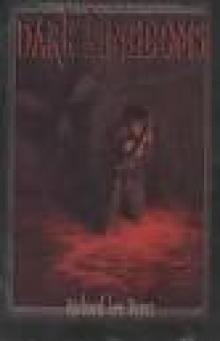 Dark Kingdoms
Dark Kingdoms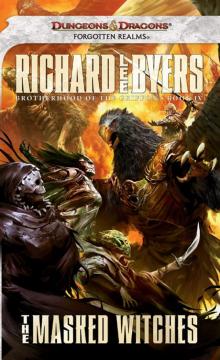 The Masked Witches: Brotherhood of the Griffon, Book IV
The Masked Witches: Brotherhood of the Griffon, Book IV The Plague Knight and Other Stories
The Plague Knight and Other Stories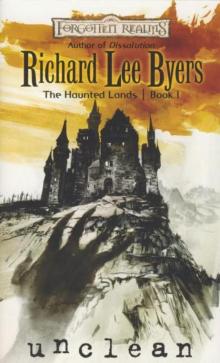 Unclean: The Haunted Lands
Unclean: The Haunted Lands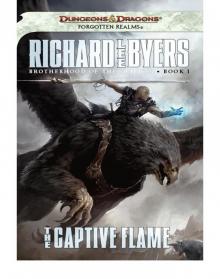 The Captive Flame: Brotherhood of the Griffon • Book 1
The Captive Flame: Brotherhood of the Griffon • Book 1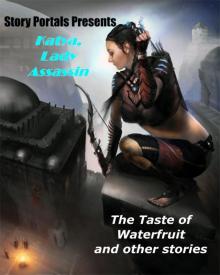 The Taste of Waterfruit and Other Stories (Story Portals)
The Taste of Waterfruit and Other Stories (Story Portals)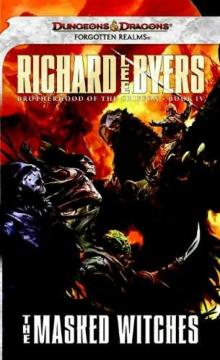 The masked witches botg-4
The masked witches botg-4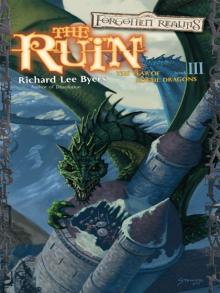 The Ruin
The Ruin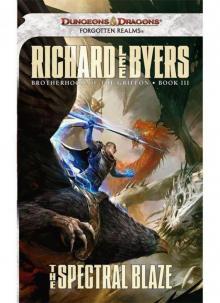 The Spectral Blaze botg-3
The Spectral Blaze botg-3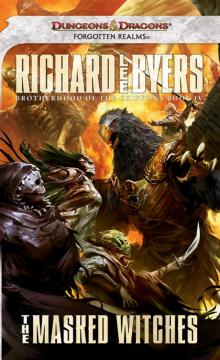 The Masked Witches
The Masked Witches Blind God's bluff bf-1
Blind God's bluff bf-1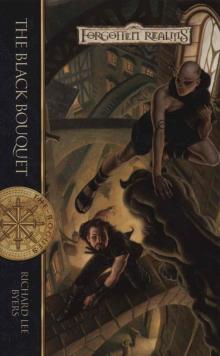 The Black Bouquet r-2
The Black Bouquet r-2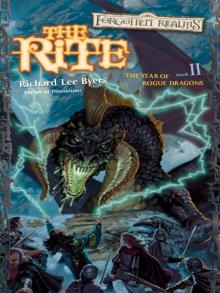 The Rite
The Rite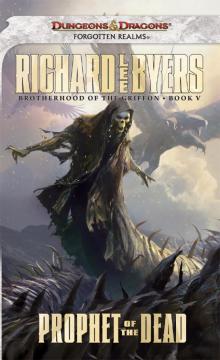 Prophet of the Dead: Forgotten Realms
Prophet of the Dead: Forgotten Realms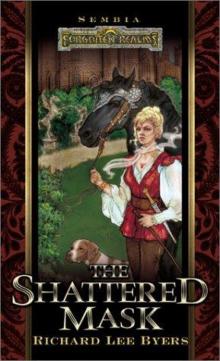 The Shattered Mask s-3
The Shattered Mask s-3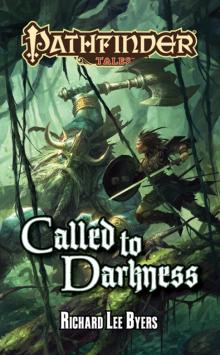 Called to Darkness
Called to Darkness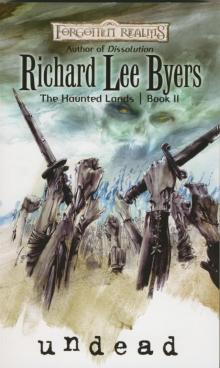 Undead hl-2
Undead hl-2 Blind God's Bluff: A Billy Fox Novel
Blind God's Bluff: A Billy Fox Novel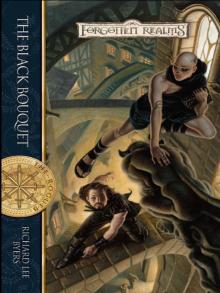 The Black Bouquet
The Black Bouquet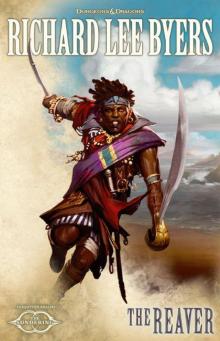 The Reaver
The Reaver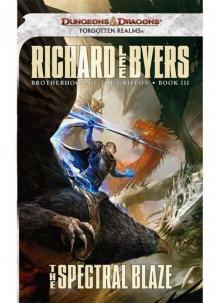 The Spectral Blaze: A Forgotten Realms Novel
The Spectral Blaze: A Forgotten Realms Novel Queen of the Depths
Queen of the Depths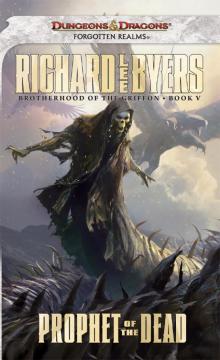 Prophet of the Dead botg-5
Prophet of the Dead botg-5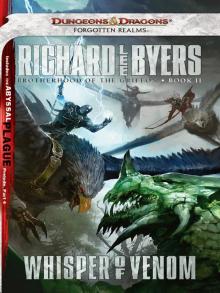 Whisper of Venom: Brotherhood of the Griffon, Book II
Whisper of Venom: Brotherhood of the Griffon, Book II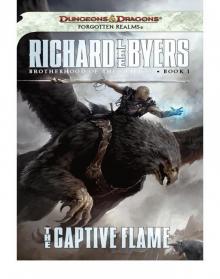 The Captive Flame botg-1
The Captive Flame botg-1 The Haunted Lands: Book III - Unholy
The Haunted Lands: Book III - Unholy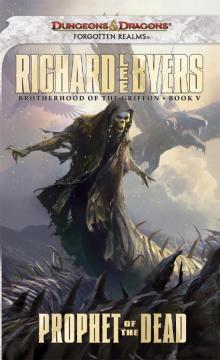 Prophet of the Dead
Prophet of the Dead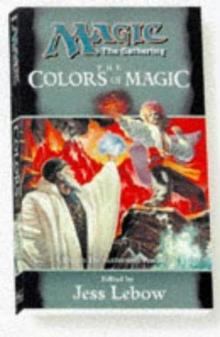 The Colors of Magic Anthology (magic: the gathering)
The Colors of Magic Anthology (magic: the gathering) Unholy hl-3
Unholy hl-3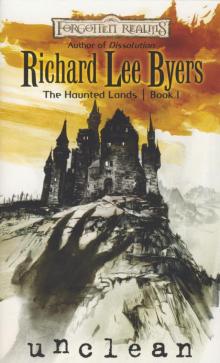 Unclean hl-1
Unclean hl-1 Blind God's Bluff
Blind God's Bluff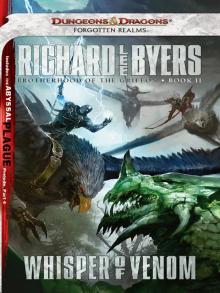 Whisper of Venom botg-2
Whisper of Venom botg-2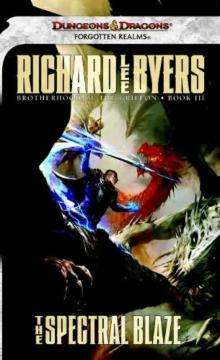 The Spectral Blaze
The Spectral Blaze